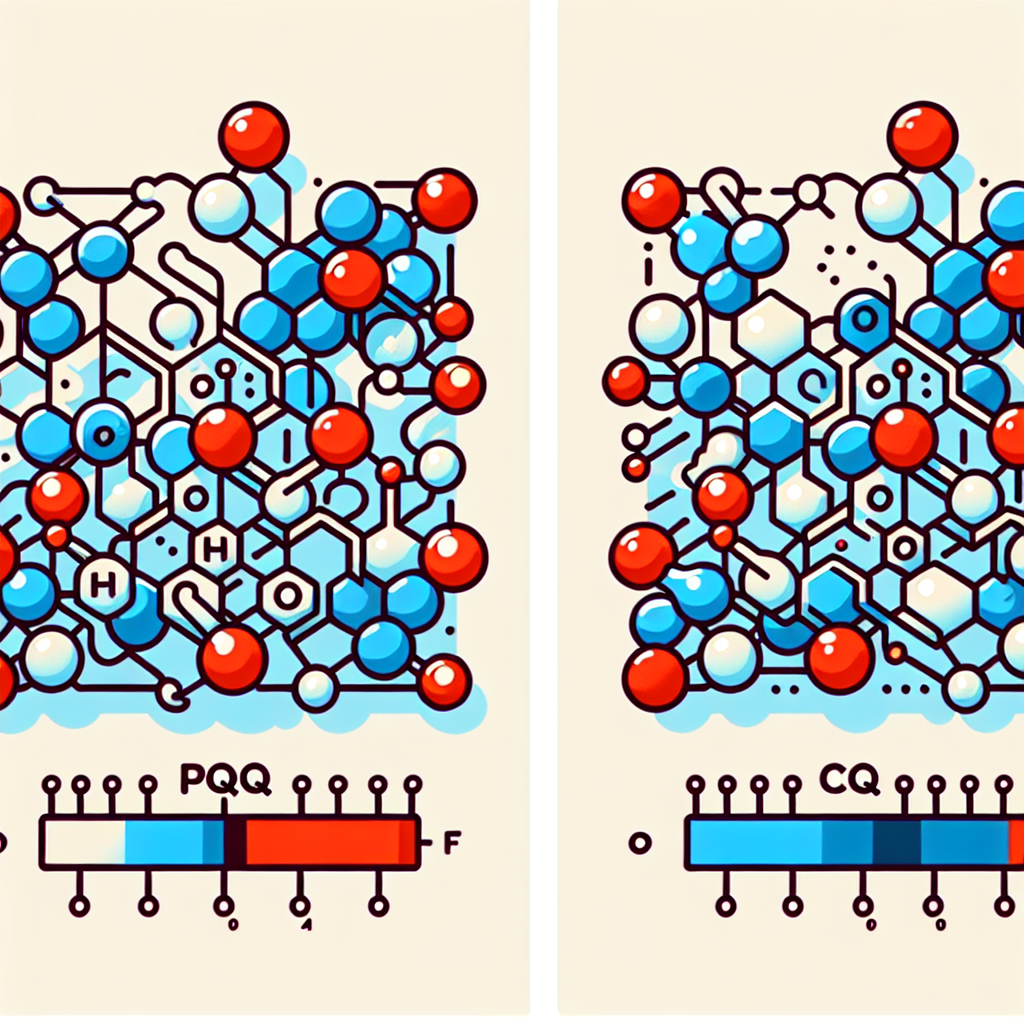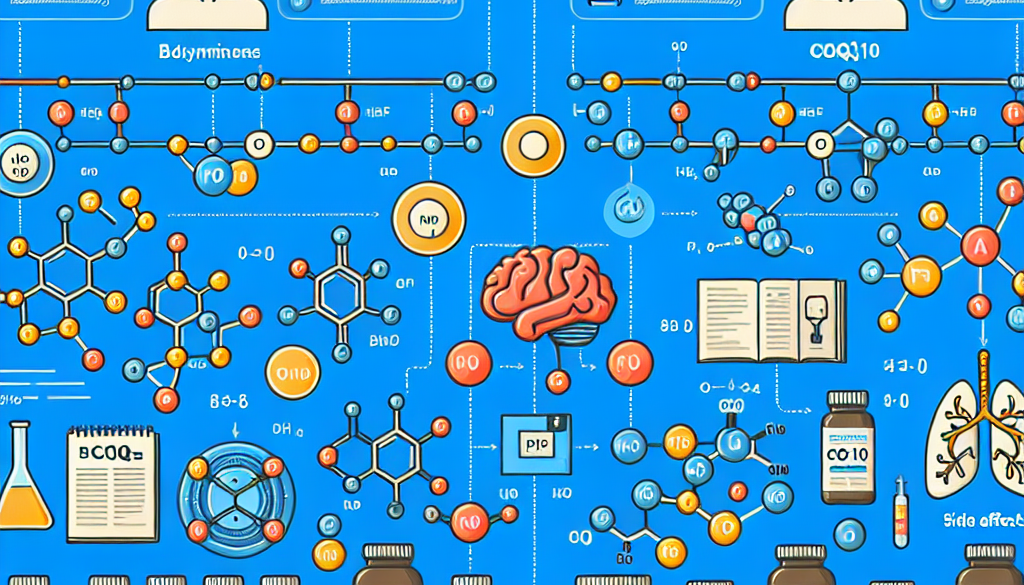Difference Between PQQ and CoQ10
-
Table of Contents
PQQ vs. CoQ10: Understanding the Distinct Health Benefits

When it comes to supplements that support energy production and cellular health, two compounds often come to mind: PQQ (Pyrroloquinoline Quinone) and CoQ10 (Coenzyme Q10). Although they share some similarities in their roles within the body, they are distinct molecules with unique benefits. This article will delve into the differences between PQQ and CoQ10, exploring their functions, health benefits, and how they complement each other.
What is PQQ?
Pyrroloquinoline Quinone, or PQQ, is a nutrient considered to be a novel cofactor with antioxidant properties. It plays a crucial role in cellular energy metabolism and supports the growth and function of mitochondria, the powerhouses of the cell. PQQ is found in various foods such as kiwifruit, green peppers, parsley, and human breast milk.
What is CoQ10?
Coenzyme Q10, commonly known as CoQ10, is a fat-soluble substance that is present in every cell of the body. It is essential for the production of ATP (adenosine triphosphate), which is the primary energy currency of the cell. CoQ10 also serves as an antioxidant, protecting cells from oxidative damage. It is naturally found in foods like organ meats, fatty fish, and whole grains.
Key Differences Between PQQ and CoQ10
- Chemical Structure: PQQ and CoQ10 have different chemical structures, which influence their respective roles in the body. PQQ is a quinone molecule, while CoQ10 is a quinol molecule.
- Function in the Body: PQQ is known for its role in the biogenesis of mitochondria, while CoQ10 is essential for the function of existing mitochondria and energy production.
- Antioxidant Properties: Both PQQ and CoQ10 have antioxidant properties, but they act in different ways. PQQ is considered a redox modulator, capable of carrying out thousands of electron transfers without breaking down, while CoQ10 helps to regenerate other antioxidants like vitamin E.
- Food Sources: While both are found in food, PQQ is less abundant in the typical diet compared to CoQ10.
Health Benefits of PQQ
- Neuroprotection: PQQ has been shown to protect neurons from oxidative damage and may have a beneficial effect on cognitive health and memory.
- Supports Mitochondrial Function: By promoting the growth of new mitochondria, PQQ can enhance energy metabolism and vitality.
- Cardioprotective Effects: PQQ may help to reduce the size of damaged areas caused by acute heart attacks, offering cardioprotective benefits.
Health Benefits of CoQ10
- Energy Production: CoQ10 is crucial for the generation of ATP, thus supporting overall energy levels.
- Antioxidant Support: As an antioxidant, CoQ10 helps to neutralize free radicals and reduce oxidative stress.
- Heart Health: CoQ10 has been linked to improved heart function and is often recommended for individuals taking statins, which can reduce CoQ10 levels in the body.
Combining PQQ and CoQ10
While PQQ and CoQ10 can be taken separately, they can also be combined for synergistic effects. The combination supports both the creation of new mitochondria and the function of existing ones, potentially offering enhanced benefits for energy levels, cognitive function, and overall health.
Case Studies and Research
Several studies have highlighted the distinct benefits of PQQ and CoQ10. For instance, a 2012 study published in the Journal of Nutritional Biochemistry found that PQQ supplementation resulted in improved cognitive function in middle-aged and elderly individuals. Similarly, research on CoQ10 has demonstrated its efficacy in reducing symptoms of heart failure and improving exercise capacity.
Conclusion: Key Takeaways
In summary, PQQ and CoQ10 are both critical for cellular health but serve different functions within the body. PQQ is primarily involved in the growth and development of new mitochondria, while CoQ10 is essential for the energy production process within existing mitochondria. Both have antioxidant properties and offer a range of health benefits, from neuroprotection to heart health. When combined, they may provide a comprehensive approach to supporting cellular energy and vitality.
ETChem’s Protein Products Recommendation
If you’re looking to enhance your health regimen with high-quality protein products, consider exploring ETChem’s offerings. Their extensive range of collagen products, including marine, fish, bovine, and chicken collagen, provides excellent options for those seeking to support their health with premium protein supplements. ETChem’s commitment to quality and customer satisfaction makes them a top choice for your protein needs.
About ETChem:
ETChem, a reputable Chinese Collagen factory manufacturer and supplier, is renowned for producing, stocking, exporting, and delivering the highest quality collagens. They include marine collagen, fish collagen, bovine collagen, chicken collagen, type I collagen, type II collagen and type III collagen etc. Their offerings, characterized by a neutral taste, instant solubility attributes, cater to a diverse range of industries. They serve nutraceutical, pharmaceutical, cosmeceutical, veterinary, as well as food and beverage finished product distributors, traders, and manufacturers across Europe, USA, Canada, Australia, Thailand, Japan, Korea, Brazil, and Chile, among others.
ETChem specialization includes exporting and delivering tailor-made collagen powder and finished collagen nutritional supplements. Their extensive product range covers sectors like Food and Beverage, Sports Nutrition, Weight Management, Dietary Supplements, Health and Wellness Products, ensuring comprehensive solutions to meet all your protein needs.
As a trusted company by leading global food and beverage brands and Fortune 500 companies, ETChem reinforces China’s reputation in the global arena. For more information or to sample their products, please contact them and email karen(at)et-chem.com today.




